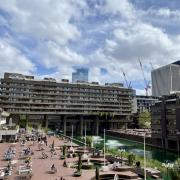
When he sat down in a pub that banned black people, Stephenson helped create change Britain’s discrimination laws. He talks about organising the Bristol Bus Boycott, attacks from the National Front and why Muhammed Ali composed a poem/article about him.
Paul Stephenson (born 6th May 1937) is a community worker, activist and long-time campaigner for civil rights for the British African-Caribbean community in Bristol.
I believe Paul Stephenson helped change Britain’s discrimination laws through the Bristol Bus Boycott and when he staged a sit in at a pub that was notorious for banning black people called the Bay Horse pub where he was also refused service after the owner noticed he was black. In 1964 it was legal to refuse service based on someone's skin colour which not only affected Black people but also Asians to and not only pubs but working men’s clubs and even housing and employment. This made it seem like apartheid but in Britain.
One reason why I believe Paul Stephenson helped change Britain’s discrimination laws was his one-man sit in which was caused by the refusal of the Bristol Omnibus Company to employ Black or Asian conductors and drivers which lasted for four months until the company backed down and overturned their discriminate colour bar policy which was similar to the racist Jim Crow laws in the Southern states of America that segregated African-Americans and White Americans from different public places such as waiting rooms, bars, cinemas, Woolworth department store lunch counters, buses and also theatres. This boycott was also similar to the Montgomery Bus Boycott in which Rosa Parks refused to give up her seat to a white person whilst sitting next to a white American.
I also believe the 1965 Race Relations Act which was passed after months of Paul Stephenson and the whole country coming together to Desegregate Bristol buses and abolish the racist colour bar policy used in pubs was a turning point which changed Black and Asian lives for the better since it outlawed (banned) discrimination on the grounds of skin colour, race, ethnic or national origins in public places. The race relations act also set up a new race relations board which would consist of a chairman and two other members appointed by the Secretary of State. I also believe the race relations act was a success because it banned discrimination and managed to convict a member of the nationalist society party and it also convicted people who stirred hatred against people who were Black, Asian and White and ethnic or national origins. The act didn’t just convict white supremacists but also the black power leader Michael Abdul Malik and four members of the Universal Coloured Peoples Association. Therefore, the act was able to bring racial discriminations to justice no matter their background and to unite the whole country and Abolish Segregation.
Paul Stephenson, a civil rights activist campaigning for the rights of the African-Caribbean community, was an army hero when he joined the Royal Air Force as a cadet for 7 years and then went on to study as a youth worker before moving to Bristol. In 1962 Paul Stephenson became a youth and community development worker as well as a supply teacher. I believe it's very important that black people who served within the British forces are treated in the same manner as their white counterparts, as this is so often overlooked and ignored. But shouldn't this apply to all races? So why is this we use and abuse our fellow citizens. Don’t they have just as many rights to live in this great country as we do. And why do the media often talk more about white veterans than black veterans. We do need answers to these questions. Otherwise nothing changes.
Paul Stephenson was probably looking for answers to those questions, when he raised his point to confirm the company was refusing to allow Black or Asian drivers and conductors. The Bristol Bus Boycotters tested a case, so Stephenson phoned the company to secure an interview as a driver. The company assumed he was white due to his faultless English accent but when Bailey turned up and they saw he was black they immediately turned him away.
So, what does this say about our country as a whole? Are we a racist nation just like the United States of America? For Paul Stephenson he took that fight/message and ended segregation in Britain. So was Paul Stevenson a hero or a good citizen serving his people and country. Ending segregation are we better off today as a whole than we were in the 20th century, or have we got a lot more to learn in the 21st century. Shouldn’t Black History be taught as a curriculum in our History classes i.e. Sociology and shouldn't we be having more dialogue on slavery past and present day.



























